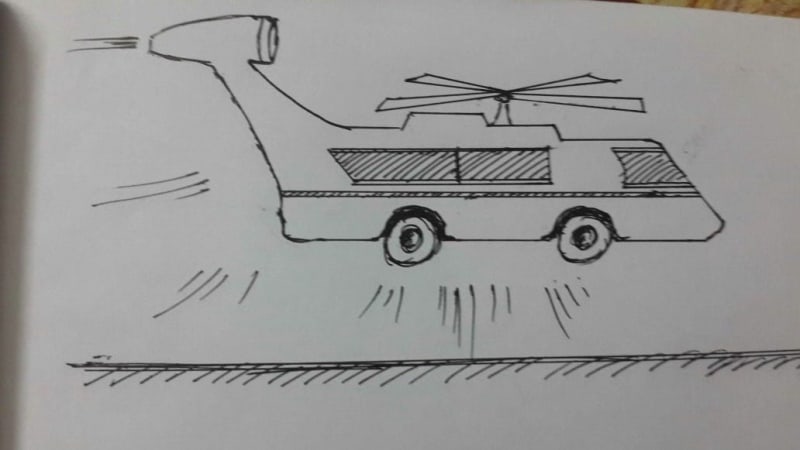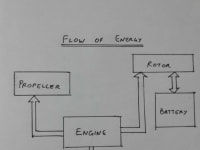By the time you finish reading this sentence, a man has died even before reaching the hospital. Trivialities such as traffic, unfavorable road conditions, irresponsible driving should not be allowed to decide the fate of a man. Can life be left to chance? When a hiker, pilgrim or a traveller gets stuck in a desolate region as a consequence of natural calamities, what happens?Can his fate be left to the hands of nature? The primary purpose of this design is to ensure that such teething troubles are pushed into oblivion. A smarter transportation mode, capable of both land and air travel which can be utilized in life saving missions is proposed in this literature. The basic idea behind this concept is to introduce a vehicle capable of circumventing the problem of road traffic by virtue of instantaneous transformation into a flying device.This is achieved by the synergy of a classical road vehicle with a modern vertical lift off mechanism.
Basic design & working:This hybrid vehicle runs on a typical IC engine and a battery.They are capable of powering the vehicle effectively.The engine,located at the rear of the vehicle is coupled to two propellers,one on top for lift off and one at the rear to provide the desired thrust whilst the vehicle is in the air.On land,it behaves as a standard road vehicle running purely on the power developed by the IC engine.The effect of air striking the blades of the propeller creates a rotary motion,used to generate electrical energy that is stored in the battery.This energy from the battery along with power from the engine is used to create the required force for the initial lift off.The controls for the land and air travel are both provided in the same chamber which reduces space.When land travel is sufficient for swift movement,the ambulance runs no differently than a standard one.During this period,the battery is charged by both the engine and the rotor simultaneously.In situations where efficient road travel is made arduous by external factors such as excessive traffic,poor roads etc,the take-off system comes to the rescue.The charged battery now runs the rotor at sufficient rpm to initiate vertical lift off.The engine now runs the propeller which aids motion in the air.
Analysis:With all the novelties that come along with this design,there are a few pertinent questions that need answering.One might wonder if the altitude attained during lift off can match that of a standard copter.For this application,the required altitude needn’t exceed even 20m,which will ensure enough clearance from traffic below as well as preventing hindrances to the road travellers due to the deflected air from the blades.Also,this upper limit on the altitude ensures that patients do not suffer from variations in atmospheric conditions such as drop in pressure.To alert nearby travellers,a unique siren/alarm system can be employed when the vehicle is about to initiate immediate lift off.While the cost of production may prove to be a hindrance to feasibility,the fact that this design could actually save a fellow human being makes it all worthwhile.If we cannot invest in saving ourselves,what else would we invest in?
Like this entry?
-
About the Entrant
- Name:Aravindan Rajasekharan
- Type of entry:teamTeam members:Ajai Thangaswami-classmate
S.R.Arjun-classmate
Arul.T.S-classmate - Software used for this entry:None
- Patent status:none





